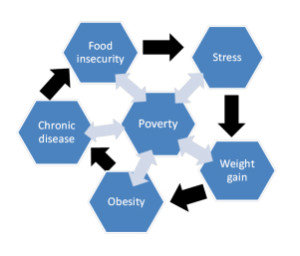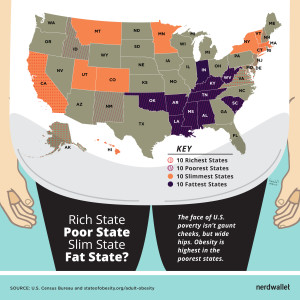A popular theory today in society is whether or not obesity is related to poverty. Some people agree with this, while others disagree. Personally, I feel the connection is only having to buy cheaper, less healthy food, so I wanted to find out more. After doing some research on the topic several studies were done; one between obesity and adults, than another comparing obesity to children. In both studies, regardless of age, the poorer group of people had a greater BMI (body mass index) and also had larger percentages that were obese. For the adult group the article stated it was, “higher every year between 1986 and 2002 among adults in the lowest income group and the lowest education group than among those in the highest income and education groups, respectively (Truong & Sturm, 2005).” referring to BMI. The article continued, “Those with low wages had increased BMI as well as increased chance of being obese (Kim & Leigh, 2010).” So now there is a concept of the poor being less educated. Could being less educated be a confounding variable (Z)? As of right now being poor is the independent variable (X) and it seems to lead to obesity, the dependent variable (Y).
Furthermore, children had similar results as the adults did. For example, further down in the same article the author wrote, “Obesity rates increased by 10 percent for all U.S. children 10- to 17-years old between 2003 and 2007, but by 23 percent during the same time period for low-income children (Singh et al., 2010a). This national study of more than 40,000 children also found that in 2007, children from lower income households had more than two times higher odds of being obese than children from higher income households.” These odds as one can see are greater than 5%, which means it is clearly not chance. Whether comparing children or adults to obesity and having excess body fat, there is a connection. It may be causation, but is more likely a correlation.
Additionally, as Hedwig Lee stated in a different article, “Families choose high-fat foods dense with energy… because these foods are more affordable and last longer than fresh vegetables and fruits and lean meats and fish.” This statement may be true, however I disagree with it. I eat plenty of junk food and unhealthy snacks, yet I am not close to being overweight or obese. This can be due to chance, the fact that I work out, or my genes considering no one on my family is over weight.
 After my findings, I concluded money or a specific salary couldn’t determine a person’s weight. Money can control what a person east though and how healthy the substance is. Also being poorer may make it difficult to obtain a gym membership to help stay fit. However, a person’s genes have a massive effect on how the body works such as metabolism rate. Some have faster metabolisms than others, which may make it challenging to even gain any weight in general, even with an unhealthy appetite and lack of exercise. Therefore, poverty is a confounding variable. It does not directly cause obesity, but may limit an individual to make decisions leading to excessive weight gains.
After my findings, I concluded money or a specific salary couldn’t determine a person’s weight. Money can control what a person east though and how healthy the substance is. Also being poorer may make it difficult to obtain a gym membership to help stay fit. However, a person’s genes have a massive effect on how the body works such as metabolism rate. Some have faster metabolisms than others, which may make it challenging to even gain any weight in general, even with an unhealthy appetite and lack of exercise. Therefore, poverty is a confounding variable. It does not directly cause obesity, but may limit an individual to make decisions leading to excessive weight gains.
Works Cited:
http://www.scholarsstrategynetwork.org/content/why-poverty-leads-obesity-and-life-long-problems



I find it to be very ironic that those who have enough money to eat as much as they please are the ones in better shape. I think another confounding variable could be what is technically considered “poverty” because when I think of true poverty I think of malnutrition not obesity. Middle to lower class people may be more likely to be obese because the dollar menu at McDonald’s is cheaper than Wegmans. But truely poor individuals ( with families to take care of- another confounding variable) don’t have enough to nourish themselves and their children. Lastly I would like to know if obesity is hereditary?